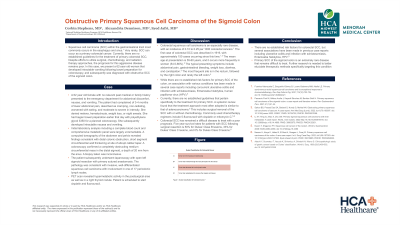Sunday Poster Session
Category: Colon
P0309 - Obstructive Primary Squamous Cell Carcinoma of the Sigmoid Colon
Sunday, October 22, 2023
3:30 PM - 7:00 PM PT
Location: Exhibit Hall

Has Audio

Corbin Stephens, MD
Overland Park Regional Medical Center
Overland Park, KS
Presenting Author(s)
Corbin Stephens, MD1, Alexandria Dennison, MD1, Syed Jafri, MD2
1Overland Park Regional Medical Center, Overland Park, KS; 2Menorah Medical Center, Overland Park, KS
Introduction: Squamous cell carcinoma (SCC) within the gastrointestinal tract most commonly occurs in the esophagus and anus. Very rarely, SCC can occur as a primary colorectal cancer. Currently, there are no established guidelines for the treatment of primary colorectal SCC. Despite efforts to utilize surgical, chemotherapy, and radiation therapy approaches, the prognosis for this aggressive disease remains poor. In this case, we present a 62-year old woman that developed intractable vomiting following bowel preparation for colonoscopy, and subsequently was diagnosed with obstructive SCC of the sigmoid colon.
Case Description/Methods: A 62-year-old female with no relevant past medical or family history presented to the emergency department for abdominal discomfort, nausea, and vomiting. The patient had complained of three to four months of lower abdominal pain, described as cramping, non-radiating, worsened with eating, and moderate to severe in intensity. She denied melena, hematochezia, change in bowel habits, and fatigue. She had begun bowel preparation earlier that day with polyethylene glycol 3350 for a planned colonoscopy. She subsequently developed intractable nausea and vomiting.
Initial laboratory analysis including a complete blood count and comprehensive metabolic panel were largely unremarkable. A computed tomography of the abdomen and pelvis revealed findings consistent with distal colonic obstruction, short segment circumferential wall thickening at site of abrupt caliber taper. A colonoscopy confirmed a completely obstructing medium circumferential mass in the distal sigmoid, a depth of 20 mm from the anus. A biopsy taken was inconclusive. The patient subsequently underwent laparoscopy with open left sigmoid resection with primary sutured anastomosis. The pathology was consistent with invasive, well-differentiated squamous cell carcinoma with involvement in one of 17 pericolonic lymph nodes. PET scan revealed hypermetabolic activity in the postsurgical area
as well as in a right thyroid nodule. Patient is scheduled to start
cisplatin and fluorouracil.
Discussion: There are no established risk factors for colorectal SCC, but several associations have been made in previous case reports including ulcerative colitis and infection with schistosomiasis, Entamoeba histolytica, HPV. Primary SCC of the sigmoid colon is an extremely rare disease that remains difficult to treat. Further research is needed to better elucidate therapeutic methods specifically targeting this condition.
Disclosures:
Corbin Stephens, MD1, Alexandria Dennison, MD1, Syed Jafri, MD2. P0309 - Obstructive Primary Squamous Cell Carcinoma of the Sigmoid Colon, ACG 2023 Annual Scientific Meeting Abstracts. Vancouver, BC, Canada: American College of Gastroenterology.
1Overland Park Regional Medical Center, Overland Park, KS; 2Menorah Medical Center, Overland Park, KS
Introduction: Squamous cell carcinoma (SCC) within the gastrointestinal tract most commonly occurs in the esophagus and anus. Very rarely, SCC can occur as a primary colorectal cancer. Currently, there are no established guidelines for the treatment of primary colorectal SCC. Despite efforts to utilize surgical, chemotherapy, and radiation therapy approaches, the prognosis for this aggressive disease remains poor. In this case, we present a 62-year old woman that developed intractable vomiting following bowel preparation for colonoscopy, and subsequently was diagnosed with obstructive SCC of the sigmoid colon.
Case Description/Methods: A 62-year-old female with no relevant past medical or family history presented to the emergency department for abdominal discomfort, nausea, and vomiting. The patient had complained of three to four months of lower abdominal pain, described as cramping, non-radiating, worsened with eating, and moderate to severe in intensity. She denied melena, hematochezia, change in bowel habits, and fatigue. She had begun bowel preparation earlier that day with polyethylene glycol 3350 for a planned colonoscopy. She subsequently developed intractable nausea and vomiting.
Initial laboratory analysis including a complete blood count and comprehensive metabolic panel were largely unremarkable. A computed tomography of the abdomen and pelvis revealed findings consistent with distal colonic obstruction, short segment circumferential wall thickening at site of abrupt caliber taper. A colonoscopy confirmed a completely obstructing medium circumferential mass in the distal sigmoid, a depth of 20 mm from the anus. A biopsy taken was inconclusive. The patient subsequently underwent laparoscopy with open left sigmoid resection with primary sutured anastomosis. The pathology was consistent with invasive, well-differentiated squamous cell carcinoma with involvement in one of 17 pericolonic lymph nodes. PET scan revealed hypermetabolic activity in the postsurgical area
as well as in a right thyroid nodule. Patient is scheduled to start
cisplatin and fluorouracil.
Discussion: There are no established risk factors for colorectal SCC, but several associations have been made in previous case reports including ulcerative colitis and infection with schistosomiasis, Entamoeba histolytica, HPV. Primary SCC of the sigmoid colon is an extremely rare disease that remains difficult to treat. Further research is needed to better elucidate therapeutic methods specifically targeting this condition.
Disclosures:
Corbin Stephens indicated no relevant financial relationships.
Alexandria Dennison indicated no relevant financial relationships.
Syed Jafri indicated no relevant financial relationships.
Corbin Stephens, MD1, Alexandria Dennison, MD1, Syed Jafri, MD2. P0309 - Obstructive Primary Squamous Cell Carcinoma of the Sigmoid Colon, ACG 2023 Annual Scientific Meeting Abstracts. Vancouver, BC, Canada: American College of Gastroenterology.
